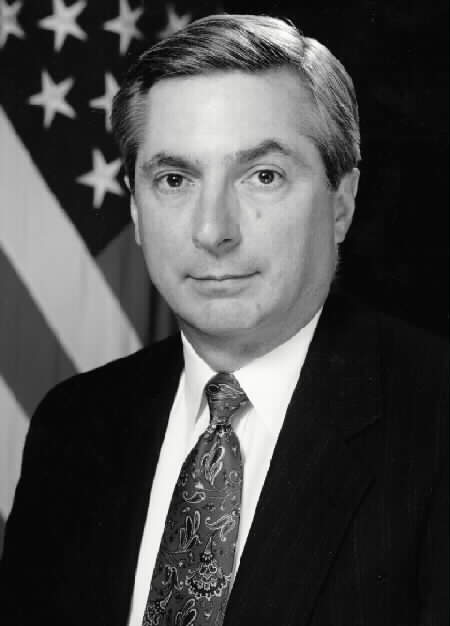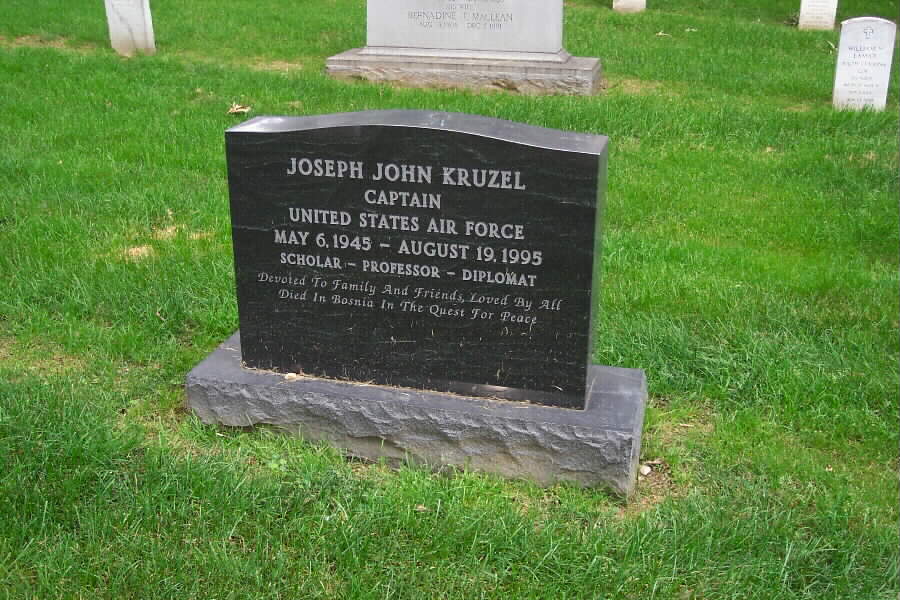August 22, 1995: JACKSON HOLE, Wyoming – President Clinton will interrupt his summer vacation tomorrow and return home to attend the memorial service for three U.S. diplomats who died Saturday in a crash en route to Sarajevo.
“He wanted to pay his respects to the Americans who were killed and to attend the services with their friends and families,” said Deputy White House Press Secretary Ginny Terzano. “He knew each of them personally,” she added. Mr. Clinton decided early yesterday morning to attend the services at Fort Myer Chapel in Arlington. First lady Hillary Rodham Clinton will accompany the president on the trip.
The bodies of Robert Frasure, 53, the special American envoy to the former Yugoslavia, Joseph Kruzel, 50, deputy assistant secretary of defense, and Air Force Colonel Sam Nelson Drew, 47, a National Security Council aide, were flown to Washington yesterday. They will be buried at Arlington National Cemetery.
Mr. Clinton does not plan to attend the individual funeral services or the interments, Miss Terzano said. She said that Mr. Frasure will be buried today and Col. Drew and Mr. Kruzel will be buried on Thursday.
Mr. Clinton’s return home follows some criticism of his decision on Saturday to express condolences from a golf course and his phone calls to the wives of the three from the greens of Teton Pines Golf Course some 10 miles from Jackson. Aides, however, defended the president and characterized the criticisms as unfair since the president spent a large chunk of time Saturday reviewing the fatal Bosnian peace trip by his three aides.
Current plans are for Mr. Clinton to fly home tomorrow, attend the two-hour memorial service, and then fly back here. He does not plan to make a stop at the White House, although those plans could change.
Former Presidents Bush and Reagan similarly broke from their vacations to return to the Oval Office. Mr. Reagan, for example, returned September 2, 1983, after the Soviet Air Force shot down Korean Air Lines Flight 007 off the coast of the Soviet Union. Mr. Bush returned August 22, 1991, after a coup attempt against Soviet President Mikhail Gorbachev.
While the deaths of the three diplomats will make it more difficult to sell the Clinton peace plan, Mr. Clinton wants the effort to push forward, according to administration officials. The top US peace envoy, Assistant Secretary of State Richard Holbrooke, is already drawing up a new peace negotiation team to return soon to Bosnia.
December 15, 1995:
President Clinton awarded the Presidential Citizens Medal postumously to three US diplomats killed in August in Bosnia-Herzegovina. Air Force Col Nelson Drew, Ambassador Robert Frasure and Joseph Kruzel were killed when their military vehicle plummeted down a mountainside cliff while on a diplomatic mission in Bosnia.
A gray-haired man in sharply creased gray flannel pants, rigidly crisp white shirt, deep red, V-neck sweater and full Windsor-knotted tie sat quietly among the senior staff around the plane’s conference table on the way to Europe. When it was his turn to speak, Joe Kruzel said in a deeply melodious, professorial voice: “Mr. Secretary, I think you should tell those lily-livered, chicken-hearted …”
With a gleam in his eye, Defense Secretary William J. Perry replied, “Well now, Joe, perhaps you should be the one to tell them …”
T oday, a Pentagon corridor was dedicated in honor of the late Joseph J. Kruzel, 50, deputy assistant secretary of defense for European and NATO policy. Senior defense officials, family members, co-workers and friends paid homage to the man who lost his life on a muddy mountain road in Bosnia in August 1995. Kruzel’s forthrightness and distinctly dry humor are legendary in the Pentagon and at defense ministries throughout Europe, according to DoD officials. With his knack of addressing tough issues directly, the diplomat would quietly tell Central and Eastern European foreign ministers seeking NATO membership: “You know, you’re not doing very well on civilian control of your military. You’ve got to have a democracy or you’re not like us.”
During prolonged meetings, he’d pass cryptic notes to his colleagues, humorously lambasting the often tedious, time-consuming, bureaucratic proceedings. Those on the receiving end squirmed trying to maintain a straight face. Born in Goldsboro, N.C., on May 6, 1945, Kruzel was the son of a military officer, and Air Force blue is the family’s dominant color. Kruzel’s father, Joseph J., is a retired Air Force Major General. His brother-in-law, Larry Farrell, is an active duty Air Force Lieutenant General. Kruzel graduated from the Air Force Academy in 1967. While on active duty for five years, he served as an intelligence officer in Vietnam and as a briefing officer for the Joint Chiefs of Staff. He also served as a member of the U.S. delegation to the Strategic Arms Limitation Talks in Finland.
After earning a master’s in public administration and a doctorate from Harvard, Kruzel was appointed special assistant to Defense Secretary Harold Brown and later legislative assistant for defense and foreign policy for Sen. Edward Kennedy. He left government service to teach at Duke University and Ohio State. In 1993, Kruzel took a leave of absence from Ohio State to serve as deputy assistant secretary of defense for European and NATO policy. One of his first undertakings was the creation of Partnership for Peace, a program designed to bring the former
Warsaw Pact nations closer to NATO. His long-range vision for lasting peace in Europe is now forging security alliances between former foes, officials said. Today, 43 European nations are in the program, which many see as a stepping stone to eventual NATO membership.
During summer 1995, reports of ethnic cleansing and mass killings in the former Yugoslavia gripped the world’s conscience. U.N. forces were continually humiliated and many critics deemed them ineffective. Congressional leaders called for decisive U.S. action. As the crisis deepened, DoD officials said, Kruzel’s expertise and diplomacy led to his becoming DoD’s chief negotiator on the U.S. team working to end the conflict. As DoD’s special envoy to Bosnia, Kruzel fought to keep U.S. ground forces out of the vicious ethnic conflict. He desperately wanted to end the war — but not at the expense of American lives.
Kruzel did not live to see his battle won. In August, he and two other U.S. negotiators were killed outside Sarajevo. A rain-soaked dirt road collapsed beneath the armored personnel carrier in which they were trying to reach Sarajevo, sending the vehicle rolling down a 500-meter slope. Four months after the envoys died, Bosnia’s warring factions signed the Dayton peace agreement. Although more than 20,000 American ground troops are now implementing that agreement, they did not become combatants during the nearly four years of civil trife.
In a recent speech, Perry described Kruzel as a gifted policymaker and dedicated peacemaker. The secretary said he counted on Kruzel’s advice on Bosnia and Partnership for Peace. “Joe Kruzel was a dear friend of mine; his loss leaves an
aching void in my life,” Perry said. “Joe was the father of the Partnership for Peace. When he died, my office was flooded with letters from the leaders of European countries — presidents, foreign ministers, defense ministers, military leaders. They all knew Joe. They all respected his achievements, and they cherished his vision.”
Officials from Canada, Western Europe, the Nordic states, the Balkans and many of the former Warsaw Pact nations mourned Kruzel’s death. Volker Ruhe, Germany’s defense minister, said Kruzel had “dedicated himself to the peace process in the Balkans with untiring energy, strategic farsightedness and creativity.” For decades, Ruhe said, German officials held Kruzel in high esteem as a man who devoted all his efforts to the service of his country, for the good of the Atlantic Alliance and American-German friendship.”
One of Kruzel’s primary tasks was overseeing NATO’s expansion, to include Central European and former Soviet-controlled nations, according to John Berry, DoD’s director of European policy. Kruzel saw the end of the Cold War and the collapse of the Soviet empire as an opportunity to rejoin Central Europe to Europe, Berry said. Kruzel wanted the newly independent countries emerging from behind the Iron Curtain to turn to the West rather than to Russia as they developed new economies and new governments.
“Nobody knew the key leaders of those countries better than he did,” Berry said. “He took time to go to them and talk with them. He knew that in order to make it work he had to go to meet them in their capitals. He had the ability to give them tough messages that they really needed to hear, but not everybody is
able to say.”
Kruzel’s name will not be forgotten. In addition to the Pentagon corridor, an auditorium was named after him at the Marshall Center in Garmisch, Germany, where Eastern and Central European military officials study democracy and Western-style military principles. A military hospital in Albania dedicated a wing in his honor.
Kruzel is buried at Arlington National Cemetery. He is survived by his wife Gail, daughter, Sarah, and son, John. During the funeral service, Walt Slocombe, undersecretary of defense for policy, said Kruzel’s field was “military policy and
national strategy, but his quest was for peace in freedom and security, for this country, for the Europe he knew so well, for the troubled Balkans where … he died.” Slocombe was Kruzel’s boss and a long-time friend. He said the unexpected death at such a young age left a great promise unfulfilled.
“Joe accomplished more in the time given him than many do in a far longer time as he worked on the hardest and most important problems — on nuclear arms control, on remaking the architecture of security for Europe, on seeking an end to the travail of the Balkans,” Slocombe said. “He fell where duty took him, doing a job he loved.”
He is buried next to his parents in Section 30 of Arlington National Cemetery.
Michael Robert Patterson was born in Arlington and is the son of a former officer of the US Army. So it was no wonder that sooner or later his interests drew him to American history and especially to American military history. Many of his articles can be found on renowned portals like the New York Times, Washingtonpost or Wikipedia.
Reviewed by: Michael Howard


